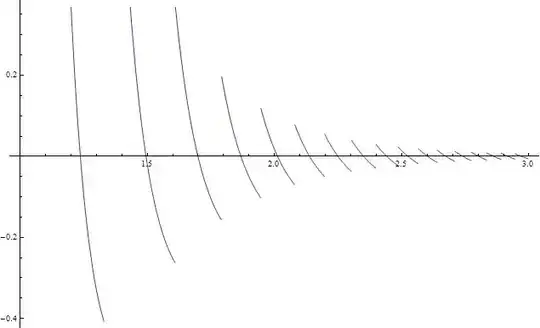show that $$\sqrt{7}^{\sqrt{8}}>\sqrt{8}^{\sqrt{7}}$$
and I found $$LHs-RHS=0.017\cdots$$
I have post this interesting problem Prove $\left(\frac{2}{5}\right)^{\frac{2}{5}}<\ln{2}$
can someone suggest any other nice method? Thank you everyone.
show that $$\sqrt{7}^{\sqrt{8}}>\sqrt{8}^{\sqrt{7}}$$
and I found $$LHs-RHS=0.017\cdots$$
I have post this interesting problem Prove $\left(\frac{2}{5}\right)^{\frac{2}{5}}<\ln{2}$
can someone suggest any other nice method? Thank you everyone.
Note that $\sqrt{7}^{\sqrt{8}}\doteq15.673$ and $\sqrt{8}^{\sqrt{7}}\doteq15.656$, so these two are pretty close. Furthermore $\sqrt{7}<e<\sqrt{8}$, and the function $f(x):={\log x\over x}$ has a local maximum at $x:=e$. This excludes the use of monotonicity arguments. The following proof uses integer arithmetic instead.
To begin with we need a rational approximation to $\sqrt{7\over8}$ that is slightly larger than $\sqrt{7\over8}$. Using Mathematica (or continued fractions) one finds that $$7\cdot 31^2=6727<6728=8\cdot 29^2\ ,$$ which implies $$\sqrt{7}\cdot31<29\cdot\sqrt{8}\ .$$ Furthermore one computes $$8^{29}=15\>47425\>04910\>67253\>43623\>90528<15\>77753\>82034\>84580\>66150\>42743=7^{31}\ .$$ It follows that $$\bigl(8^{\sqrt{7}}\bigr)^{31}<\bigl(8^{29}\bigr)^{\sqrt{8}}<\bigl(7^{31}\bigr)^{\sqrt{8}}\ .$$ Now take the $62^{\rm th}$ root on both sides.
The challenge here is to demonstrate the inequality in a way that can easily be checked by hand. Taking logs, the inequality to be proved is
$$\sqrt7\ln8 \lt \sqrt8\ln7$$
which can be written as
$$3\sqrt{1-{1\over8}}\ln2 \lt \ln(8-1) = 3\ln2+\ln(1-{1\over8})$$
so the inequality to prove is
$$-\ln\left(1-{1\over8}\right)\lt 3\left(1-\sqrt{1-{1\over8}}\right)\ln2$$
We'll use the Taylor series
$$-\ln(1-x)=x+{1\over2}x^2+{1\over3}x^3+{1\over4}x^4+\cdots$$
to obtain
$$\begin{align} -\ln\left(1-{1\over8}\right) &\lt {1\over8}+{1\over2}\left({1\over8}\right)^2+{1\over3}\left({1\over8}\right)^3+{1\over3}\left({1\over8}\right)^4\\ &={1\over8}+{1\over2}\left({1\over8}\right)^2+{1\over3}\left({1\over8}\right)^3{1\over1-{1\over8}}\\ &={1\over8}+{1\over128}+{1\over21}{1\over64}\\ &\lt{1\over8}+{1\over128}+{1\over16}{1\over64}\\ &={128+8+1\over2^{10}}\\ &={137\over2^{10}} \end{align}$$
We'll use the fact that all the coefficients in the Taylor series
$$1-\sqrt{1-x}={1\over2}x+{1\over8}x^2+{1\over16}x^3+\ldots$$
are positive to get
$$1-\sqrt{1-{1\over8}}\gt {1\over2}{1\over8}+{1\over8}\left({1\over8}\right)^2={33\over2^9}$$
Finally, we use the easily verified identity
$$\ln2=3\ln\left(1+{1\over4}\right)+\ln\left(1+{3\over125}\right)$$
and the alternating Taylor series
$$\ln(1+x)=x-{1\over2}x^2+{1\over3}x^3-\cdots$$
to get
$$\begin{align} \ln2&\gt 3\left({1\over4}-{1\over2}\left({1\over4}\right)^2+{1\over3}\left({1\over4}\right)^3-{1\over4}\left({1\over4}\right)^4\right)+{3\over125}\\ &={21\over32}+{1\over64}-{3\over1024}+{3\over125}\\ &\gt{21\over32}+{1\over64}-{3\over1024}+{3\over128}\\ &={21\cdot32+16-3+24\over1024}={709\over1024} \end{align}$$
hence
$$3\ln2\gt{2127\over1024}\gt{2126\over1024}={1063\over512}$$
so that
$$3\left(1-\sqrt{1-{1\over8}}\right)\ln2\gt{33\over2^9}{1063\over2^9}={33\cdot1063\over2^{18}}$$
Consequently, the inequality to verify is
$${137\over2^{10}}\lt{33\cdot1063\over2^{18}}$$
which is to say,
$$256\cdot137\lt33\cdot1063$$
Eschewing calculators, note that $1063=1024+32+8-1$, so
$$33\cdot1063=(2^5+1)(2^{10}+2^5+2^3-1)=2^{15}+2^{11}+2^8+2^3-1$$
whereas
$$256\cdot137=2^8(2^7+2^3+1)=2^{15}+2^{11}+2^8$$
so the desired inequality holds.
I just want to give you a bigger picture on this question. The fact you point out corresponds to $f(2)>0.$
$f(\text{x$\_$})\text{:=}\left(t=\lfloor \exp (x)\rfloor ;a=t^{1/x};b=(t+1)^{1/x};a^b-b^a\right);$
$\text{Plot}[f(x),\{x,1,3\}]$

A solution from a greek math forum.
$\frac{lne^{2}-ln7}{e^{2}-7} < \frac{1}{7} \Leftrightarrow \frac{1}{ln7} < \frac{7}{21-e^{2}}<\frac{7}{13,6}$
$\frac{ln8-lne^{2}}{8-e^{2}} >\frac{1}{8} \Leftrightarrow \frac{1}{ln8} < \frac{8}{24-e^{2}}<\frac{8}{16,6}$
So,
$ \frac{1}{ln7}+ \frac{1}{ln8} < \frac{7}{13,6}+ \frac{8}{16,6}= \frac{225}{225,76}<1$.
$\int_{ln7}^{ln8} \frac{1}{x} dx < \frac{(\frac{1}{ln7}+\frac{1}{ln8}) \cdot (ln8-ln7)}{2} < ln \sqrt{8}-ln\sqrt{7}=\int_{\sqrt{7}}^{\sqrt{8}} \frac{1}{x} dx$.
So,
$\int_{ln7}^{ln8} \frac{1}{x} dx < \int_{\sqrt{7}}^{\sqrt{8}} \frac{1}{x} dx\Leftrightarrow $
$ln\frac{ln8}{ln7} < ln \frac{\sqrt{8}}{\sqrt{7}} \Leftrightarrow \sqrt{8}ln7 > \sqrt{7} ln8 \Leftrightarrow$
$ \sqrt{7}^{\sqrt{8}}> \sqrt{8}^{\sqrt{7}}$.